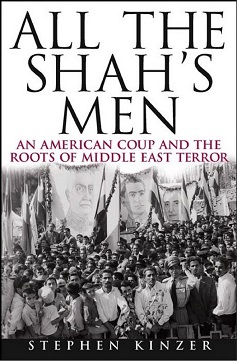
All the Shah’s Men
Stephen Kinzer
258 pages including index
published in 2003
If you read the name Roosevelt, you probably think of the American president during World War II, or perhaps his predecesor Theodore Roosevelt, who gave his name to the teddy bear. But there’s another Roosevelt who has been of some influence in world history, a grandson of Theodore, Kermit Roosevelt, Jr., the man behind the coup against the democratically elected government of Iran in 1953. That was the coup that overthrew a government nominally an ally of the United States, on the behest of a British oil company to install a dictator whose father had had nazi sympathies, who himself would be overthrown a quarter century later in the Islamic revolution of 1979, when Americans were baffled to realise most of Iran hated them, a ahtred that had its roots in 1953.
That 1953 coup is one of those monumental changes in history that are far less well known than they should be. Though not exactly a secret, the American involvement and leadership of the coup is even less known, or at least that was the case when this book was published, in the year the US would invade another former client state, Iraq. These days the sad and sordid story of American meddling in the Middle East is well known, at least to those who paid attention to what happened after 9/11. I’m not sure how much Stephen Kinzer’s book contributed to this though.